BAE Systems Plc: Unit 12 Report on Organisational Behaviour Concepts
VerifiedAdded on 2023/01/06
|12
|3936
|85
Report
AI Summary
This report provides an analysis of organisational behaviour, focusing on the context of BAE Systems Plc. It explores the influence of culture, power, and politics on individual and team behaviour within the organization. The report examines how content and process theories of motivation are applied to achieve organizational goals, including Maslow's Hierarchy of Needs and Adam's Equity Theory. Furthermore, it differentiates between effective and ineffective teams, utilizing Belbin's typology to understand team roles. The report also covers the application of organizational behaviour concepts and philosophies to address challenges and improve overall performance. The report concludes with a discussion of how BAE Systems utilizes these concepts to manage its workforce and achieve its objectives within the defense and security industry.
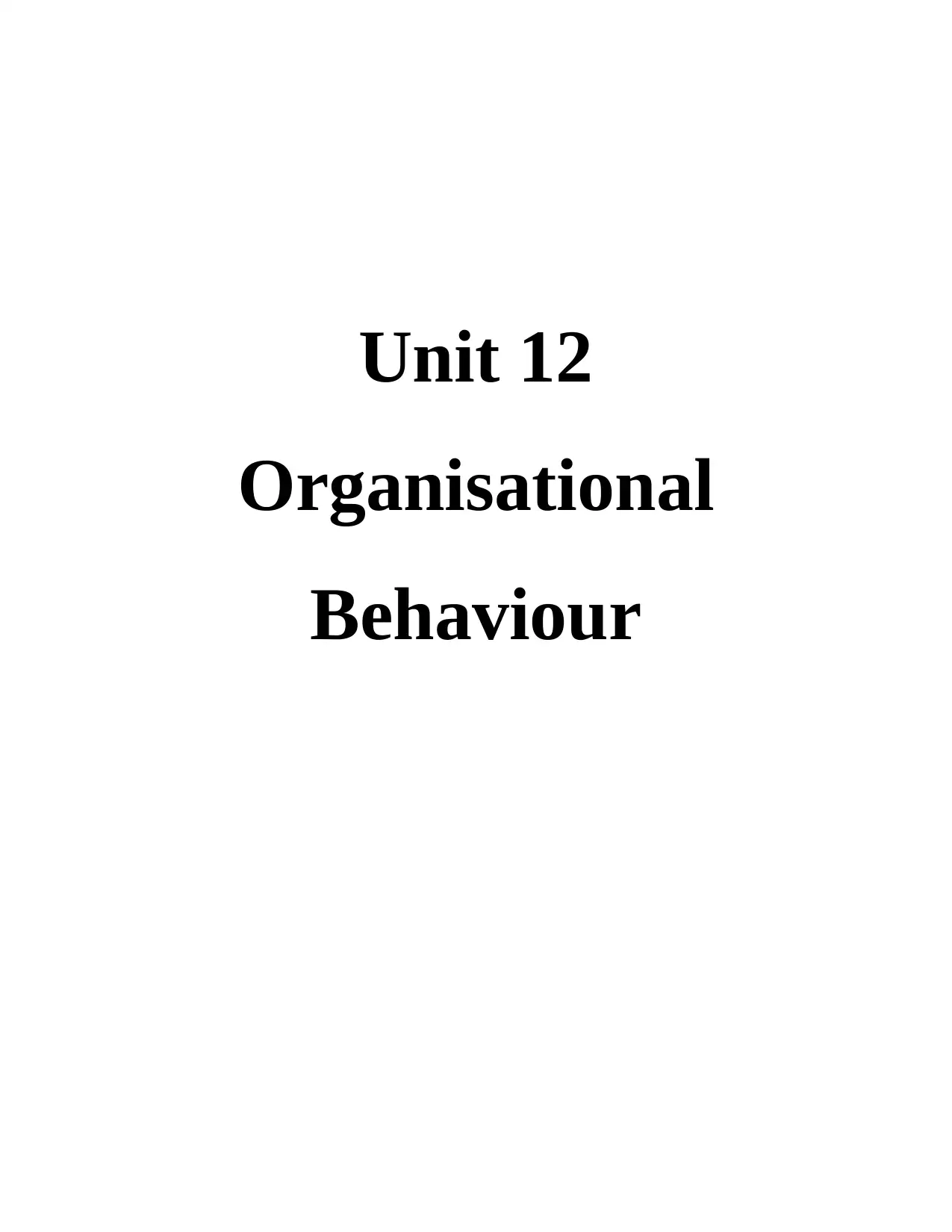
Unit 12
Organisational
Behaviour
Organisational
Behaviour
Paraphrase This Document
Need a fresh take? Get an instant paraphrase of this document with our AI Paraphraser
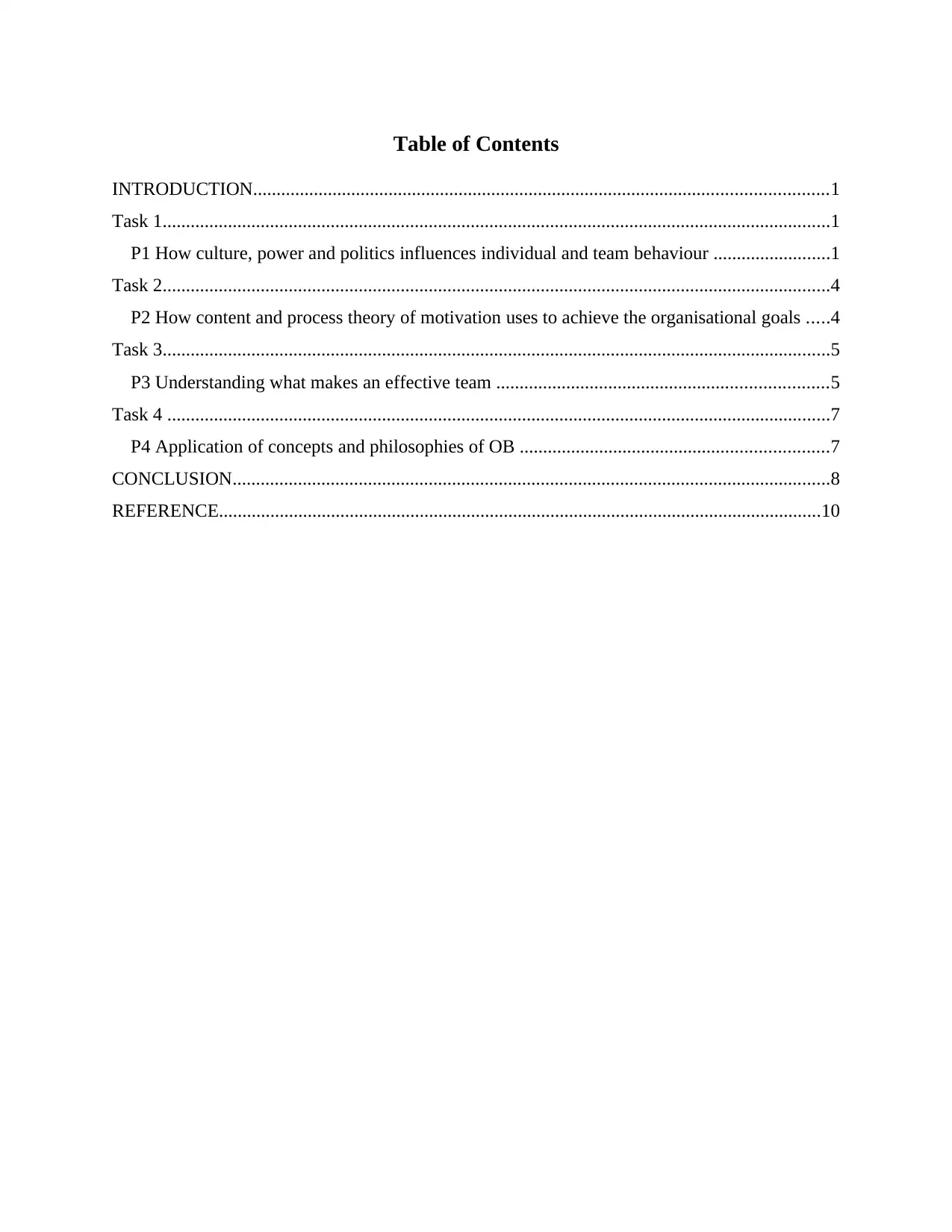
Table of Contents
INTRODUCTION...........................................................................................................................1
Task 1...............................................................................................................................................1
P1 How culture, power and politics influences individual and team behaviour .........................1
Task 2...............................................................................................................................................4
P2 How content and process theory of motivation uses to achieve the organisational goals .....4
Task 3...............................................................................................................................................5
P3 Understanding what makes an effective team .......................................................................5
Task 4 ..............................................................................................................................................7
P4 Application of concepts and philosophies of OB ..................................................................7
CONCLUSION................................................................................................................................8
REFERENCE.................................................................................................................................10
INTRODUCTION...........................................................................................................................1
Task 1...............................................................................................................................................1
P1 How culture, power and politics influences individual and team behaviour .........................1
Task 2...............................................................................................................................................4
P2 How content and process theory of motivation uses to achieve the organisational goals .....4
Task 3...............................................................................................................................................5
P3 Understanding what makes an effective team .......................................................................5
Task 4 ..............................................................................................................................................7
P4 Application of concepts and philosophies of OB ..................................................................7
CONCLUSION................................................................................................................................8
REFERENCE.................................................................................................................................10
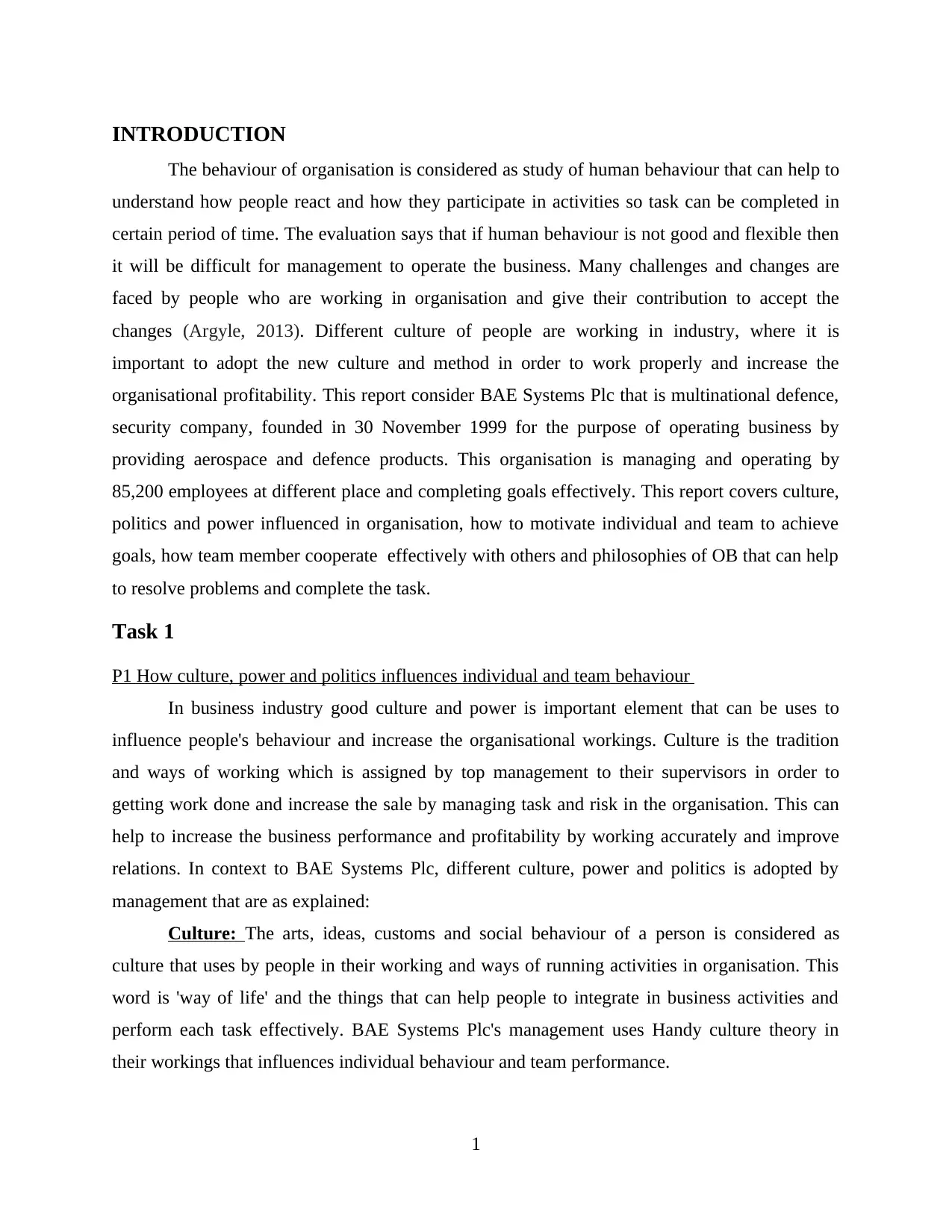
INTRODUCTION
The behaviour of organisation is considered as study of human behaviour that can help to
understand how people react and how they participate in activities so task can be completed in
certain period of time. The evaluation says that if human behaviour is not good and flexible then
it will be difficult for management to operate the business. Many challenges and changes are
faced by people who are working in organisation and give their contribution to accept the
changes (Argyle, 2013). Different culture of people are working in industry, where it is
important to adopt the new culture and method in order to work properly and increase the
organisational profitability. This report consider BAE Systems Plc that is multinational defence,
security company, founded in 30 November 1999 for the purpose of operating business by
providing aerospace and defence products. This organisation is managing and operating by
85,200 employees at different place and completing goals effectively. This report covers culture,
politics and power influenced in organisation, how to motivate individual and team to achieve
goals, how team member cooperate effectively with others and philosophies of OB that can help
to resolve problems and complete the task.
Task 1
P1 How culture, power and politics influences individual and team behaviour
In business industry good culture and power is important element that can be uses to
influence people's behaviour and increase the organisational workings. Culture is the tradition
and ways of working which is assigned by top management to their supervisors in order to
getting work done and increase the sale by managing task and risk in the organisation. This can
help to increase the business performance and profitability by working accurately and improve
relations. In context to BAE Systems Plc, different culture, power and politics is adopted by
management that are as explained:
Culture: The arts, ideas, customs and social behaviour of a person is considered as
culture that uses by people in their working and ways of running activities in organisation. This
word is 'way of life' and the things that can help people to integrate in business activities and
perform each task effectively. BAE Systems Plc's management uses Handy culture theory in
their workings that influences individual behaviour and team performance.
1
The behaviour of organisation is considered as study of human behaviour that can help to
understand how people react and how they participate in activities so task can be completed in
certain period of time. The evaluation says that if human behaviour is not good and flexible then
it will be difficult for management to operate the business. Many challenges and changes are
faced by people who are working in organisation and give their contribution to accept the
changes (Argyle, 2013). Different culture of people are working in industry, where it is
important to adopt the new culture and method in order to work properly and increase the
organisational profitability. This report consider BAE Systems Plc that is multinational defence,
security company, founded in 30 November 1999 for the purpose of operating business by
providing aerospace and defence products. This organisation is managing and operating by
85,200 employees at different place and completing goals effectively. This report covers culture,
politics and power influenced in organisation, how to motivate individual and team to achieve
goals, how team member cooperate effectively with others and philosophies of OB that can help
to resolve problems and complete the task.
Task 1
P1 How culture, power and politics influences individual and team behaviour
In business industry good culture and power is important element that can be uses to
influence people's behaviour and increase the organisational workings. Culture is the tradition
and ways of working which is assigned by top management to their supervisors in order to
getting work done and increase the sale by managing task and risk in the organisation. This can
help to increase the business performance and profitability by working accurately and improve
relations. In context to BAE Systems Plc, different culture, power and politics is adopted by
management that are as explained:
Culture: The arts, ideas, customs and social behaviour of a person is considered as
culture that uses by people in their working and ways of running activities in organisation. This
word is 'way of life' and the things that can help people to integrate in business activities and
perform each task effectively. BAE Systems Plc's management uses Handy culture theory in
their workings that influences individual behaviour and team performance.
1
⊘ This is a preview!⊘
Do you want full access?
Subscribe today to unlock all pages.

Trusted by 1+ million students worldwide
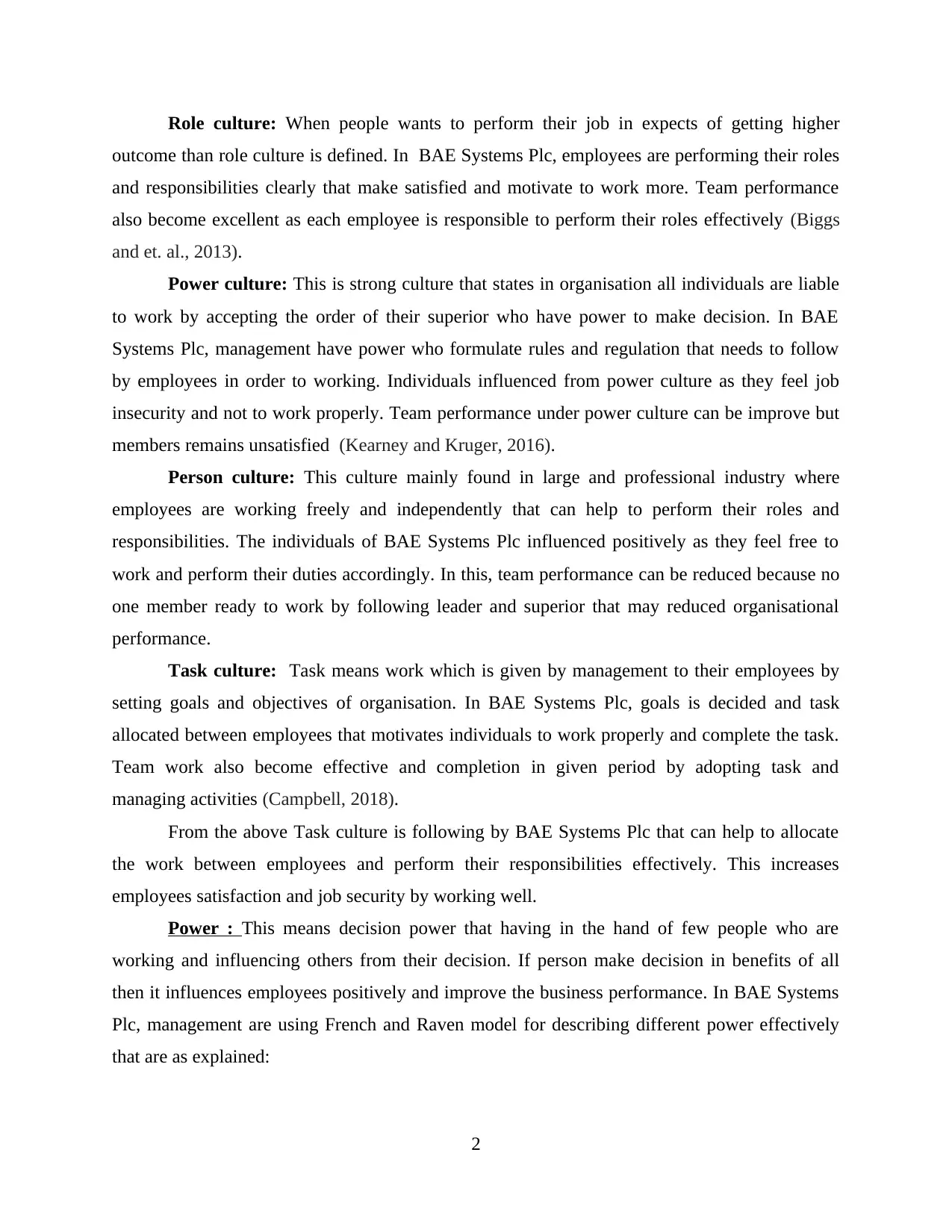
Role culture: When people wants to perform their job in expects of getting higher
outcome than role culture is defined. In BAE Systems Plc, employees are performing their roles
and responsibilities clearly that make satisfied and motivate to work more. Team performance
also become excellent as each employee is responsible to perform their roles effectively (Biggs
and et. al., 2013).
Power culture: This is strong culture that states in organisation all individuals are liable
to work by accepting the order of their superior who have power to make decision. In BAE
Systems Plc, management have power who formulate rules and regulation that needs to follow
by employees in order to working. Individuals influenced from power culture as they feel job
insecurity and not to work properly. Team performance under power culture can be improve but
members remains unsatisfied (Kearney and Kruger, 2016).
Person culture: This culture mainly found in large and professional industry where
employees are working freely and independently that can help to perform their roles and
responsibilities. The individuals of BAE Systems Plc influenced positively as they feel free to
work and perform their duties accordingly. In this, team performance can be reduced because no
one member ready to work by following leader and superior that may reduced organisational
performance.
Task culture: Task means work which is given by management to their employees by
setting goals and objectives of organisation. In BAE Systems Plc, goals is decided and task
allocated between employees that motivates individuals to work properly and complete the task.
Team work also become effective and completion in given period by adopting task and
managing activities (Campbell, 2018).
From the above Task culture is following by BAE Systems Plc that can help to allocate
the work between employees and perform their responsibilities effectively. This increases
employees satisfaction and job security by working well.
Power : This means decision power that having in the hand of few people who are
working and influencing others from their decision. If person make decision in benefits of all
then it influences employees positively and improve the business performance. In BAE Systems
Plc, management are using French and Raven model for describing different power effectively
that are as explained:
2
outcome than role culture is defined. In BAE Systems Plc, employees are performing their roles
and responsibilities clearly that make satisfied and motivate to work more. Team performance
also become excellent as each employee is responsible to perform their roles effectively (Biggs
and et. al., 2013).
Power culture: This is strong culture that states in organisation all individuals are liable
to work by accepting the order of their superior who have power to make decision. In BAE
Systems Plc, management have power who formulate rules and regulation that needs to follow
by employees in order to working. Individuals influenced from power culture as they feel job
insecurity and not to work properly. Team performance under power culture can be improve but
members remains unsatisfied (Kearney and Kruger, 2016).
Person culture: This culture mainly found in large and professional industry where
employees are working freely and independently that can help to perform their roles and
responsibilities. The individuals of BAE Systems Plc influenced positively as they feel free to
work and perform their duties accordingly. In this, team performance can be reduced because no
one member ready to work by following leader and superior that may reduced organisational
performance.
Task culture: Task means work which is given by management to their employees by
setting goals and objectives of organisation. In BAE Systems Plc, goals is decided and task
allocated between employees that motivates individuals to work properly and complete the task.
Team work also become effective and completion in given period by adopting task and
managing activities (Campbell, 2018).
From the above Task culture is following by BAE Systems Plc that can help to allocate
the work between employees and perform their responsibilities effectively. This increases
employees satisfaction and job security by working well.
Power : This means decision power that having in the hand of few people who are
working and influencing others from their decision. If person make decision in benefits of all
then it influences employees positively and improve the business performance. In BAE Systems
Plc, management are using French and Raven model for describing different power effectively
that are as explained:
2
Paraphrase This Document
Need a fresh take? Get an instant paraphrase of this document with our AI Paraphraser
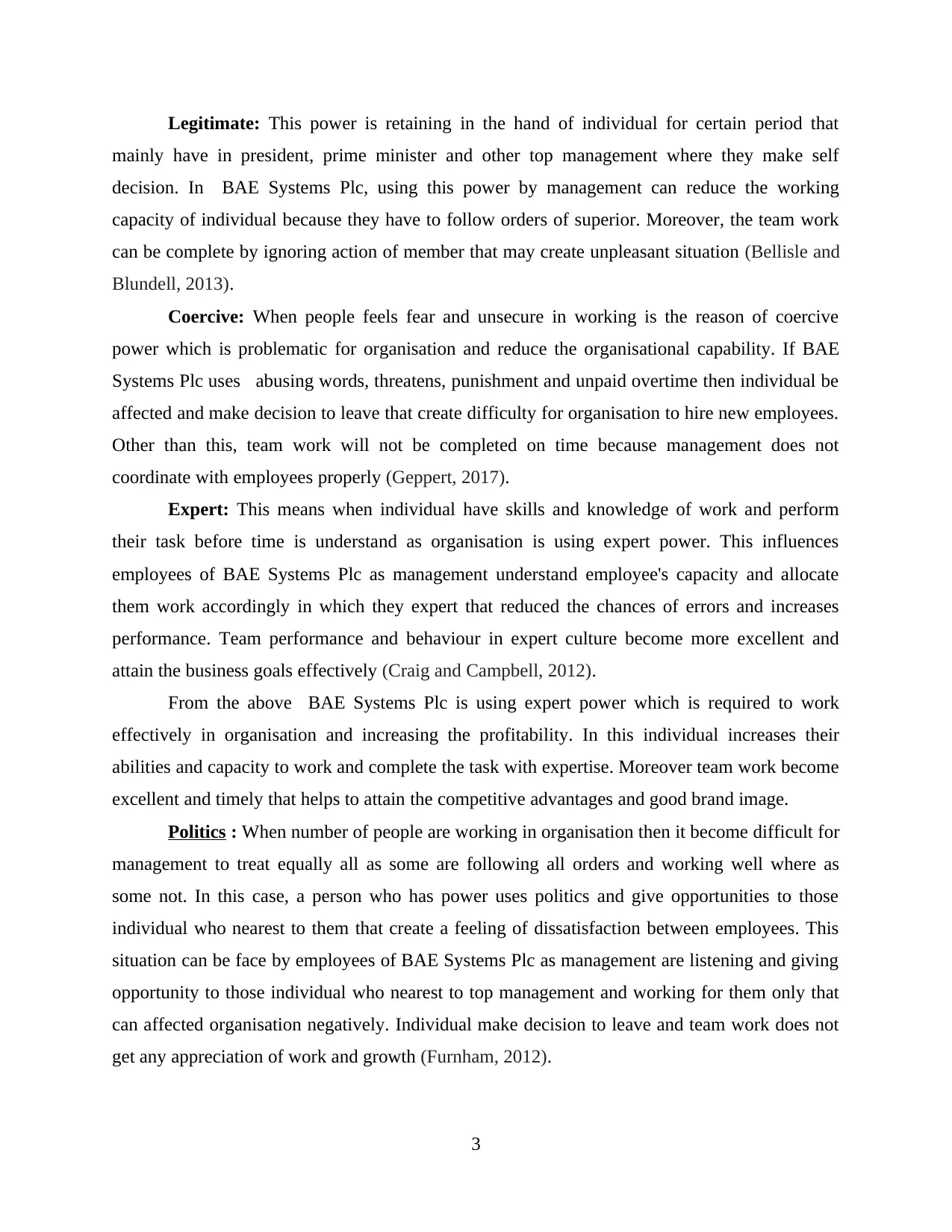
Legitimate: This power is retaining in the hand of individual for certain period that
mainly have in president, prime minister and other top management where they make self
decision. In BAE Systems Plc, using this power by management can reduce the working
capacity of individual because they have to follow orders of superior. Moreover, the team work
can be complete by ignoring action of member that may create unpleasant situation (Bellisle and
Blundell, 2013).
Coercive: When people feels fear and unsecure in working is the reason of coercive
power which is problematic for organisation and reduce the organisational capability. If BAE
Systems Plc uses abusing words, threatens, punishment and unpaid overtime then individual be
affected and make decision to leave that create difficulty for organisation to hire new employees.
Other than this, team work will not be completed on time because management does not
coordinate with employees properly (Geppert, 2017).
Expert: This means when individual have skills and knowledge of work and perform
their task before time is understand as organisation is using expert power. This influences
employees of BAE Systems Plc as management understand employee's capacity and allocate
them work accordingly in which they expert that reduced the chances of errors and increases
performance. Team performance and behaviour in expert culture become more excellent and
attain the business goals effectively (Craig and Campbell, 2012).
From the above BAE Systems Plc is using expert power which is required to work
effectively in organisation and increasing the profitability. In this individual increases their
abilities and capacity to work and complete the task with expertise. Moreover team work become
excellent and timely that helps to attain the competitive advantages and good brand image.
Politics : When number of people are working in organisation then it become difficult for
management to treat equally all as some are following all orders and working well where as
some not. In this case, a person who has power uses politics and give opportunities to those
individual who nearest to them that create a feeling of dissatisfaction between employees. This
situation can be face by employees of BAE Systems Plc as management are listening and giving
opportunity to those individual who nearest to top management and working for them only that
can affected organisation negatively. Individual make decision to leave and team work does not
get any appreciation of work and growth (Furnham, 2012).
3
mainly have in president, prime minister and other top management where they make self
decision. In BAE Systems Plc, using this power by management can reduce the working
capacity of individual because they have to follow orders of superior. Moreover, the team work
can be complete by ignoring action of member that may create unpleasant situation (Bellisle and
Blundell, 2013).
Coercive: When people feels fear and unsecure in working is the reason of coercive
power which is problematic for organisation and reduce the organisational capability. If BAE
Systems Plc uses abusing words, threatens, punishment and unpaid overtime then individual be
affected and make decision to leave that create difficulty for organisation to hire new employees.
Other than this, team work will not be completed on time because management does not
coordinate with employees properly (Geppert, 2017).
Expert: This means when individual have skills and knowledge of work and perform
their task before time is understand as organisation is using expert power. This influences
employees of BAE Systems Plc as management understand employee's capacity and allocate
them work accordingly in which they expert that reduced the chances of errors and increases
performance. Team performance and behaviour in expert culture become more excellent and
attain the business goals effectively (Craig and Campbell, 2012).
From the above BAE Systems Plc is using expert power which is required to work
effectively in organisation and increasing the profitability. In this individual increases their
abilities and capacity to work and complete the task with expertise. Moreover team work become
excellent and timely that helps to attain the competitive advantages and good brand image.
Politics : When number of people are working in organisation then it become difficult for
management to treat equally all as some are following all orders and working well where as
some not. In this case, a person who has power uses politics and give opportunities to those
individual who nearest to them that create a feeling of dissatisfaction between employees. This
situation can be face by employees of BAE Systems Plc as management are listening and giving
opportunity to those individual who nearest to top management and working for them only that
can affected organisation negatively. Individual make decision to leave and team work does not
get any appreciation of work and growth (Furnham, 2012).
3
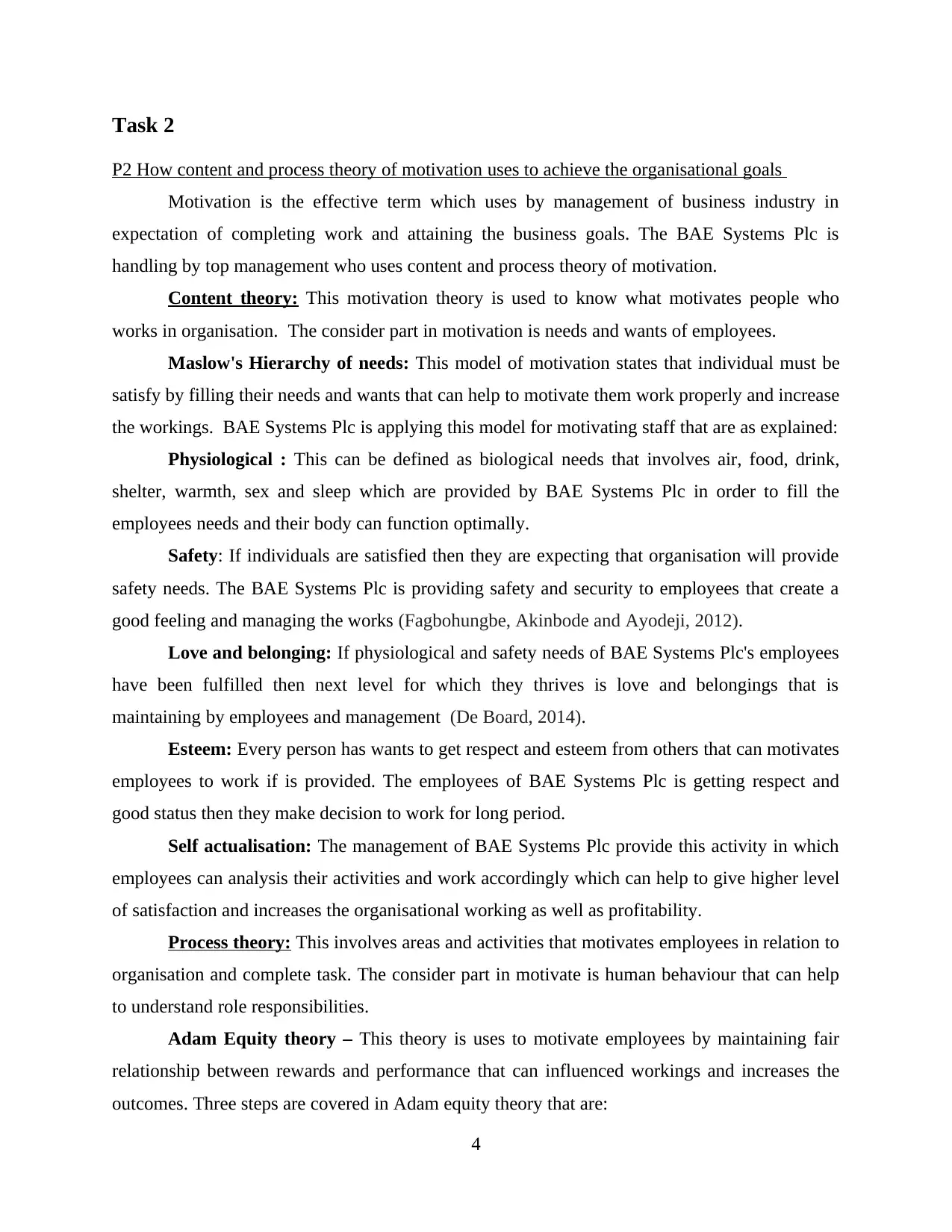
Task 2
P2 How content and process theory of motivation uses to achieve the organisational goals
Motivation is the effective term which uses by management of business industry in
expectation of completing work and attaining the business goals. The BAE Systems Plc is
handling by top management who uses content and process theory of motivation.
Content theory: This motivation theory is used to know what motivates people who
works in organisation. The consider part in motivation is needs and wants of employees.
Maslow's Hierarchy of needs: This model of motivation states that individual must be
satisfy by filling their needs and wants that can help to motivate them work properly and increase
the workings. BAE Systems Plc is applying this model for motivating staff that are as explained:
Physiological : This can be defined as biological needs that involves air, food, drink,
shelter, warmth, sex and sleep which are provided by BAE Systems Plc in order to fill the
employees needs and their body can function optimally.
Safety: If individuals are satisfied then they are expecting that organisation will provide
safety needs. The BAE Systems Plc is providing safety and security to employees that create a
good feeling and managing the works (Fagbohungbe, Akinbode and Ayodeji, 2012).
Love and belonging: If physiological and safety needs of BAE Systems Plc's employees
have been fulfilled then next level for which they thrives is love and belongings that is
maintaining by employees and management (De Board, 2014).
Esteem: Every person has wants to get respect and esteem from others that can motivates
employees to work if is provided. The employees of BAE Systems Plc is getting respect and
good status then they make decision to work for long period.
Self actualisation: The management of BAE Systems Plc provide this activity in which
employees can analysis their activities and work accordingly which can help to give higher level
of satisfaction and increases the organisational working as well as profitability.
Process theory: This involves areas and activities that motivates employees in relation to
organisation and complete task. The consider part in motivate is human behaviour that can help
to understand role responsibilities.
Adam Equity theory – This theory is uses to motivate employees by maintaining fair
relationship between rewards and performance that can influenced workings and increases the
outcomes. Three steps are covered in Adam equity theory that are:
4
P2 How content and process theory of motivation uses to achieve the organisational goals
Motivation is the effective term which uses by management of business industry in
expectation of completing work and attaining the business goals. The BAE Systems Plc is
handling by top management who uses content and process theory of motivation.
Content theory: This motivation theory is used to know what motivates people who
works in organisation. The consider part in motivation is needs and wants of employees.
Maslow's Hierarchy of needs: This model of motivation states that individual must be
satisfy by filling their needs and wants that can help to motivate them work properly and increase
the workings. BAE Systems Plc is applying this model for motivating staff that are as explained:
Physiological : This can be defined as biological needs that involves air, food, drink,
shelter, warmth, sex and sleep which are provided by BAE Systems Plc in order to fill the
employees needs and their body can function optimally.
Safety: If individuals are satisfied then they are expecting that organisation will provide
safety needs. The BAE Systems Plc is providing safety and security to employees that create a
good feeling and managing the works (Fagbohungbe, Akinbode and Ayodeji, 2012).
Love and belonging: If physiological and safety needs of BAE Systems Plc's employees
have been fulfilled then next level for which they thrives is love and belongings that is
maintaining by employees and management (De Board, 2014).
Esteem: Every person has wants to get respect and esteem from others that can motivates
employees to work if is provided. The employees of BAE Systems Plc is getting respect and
good status then they make decision to work for long period.
Self actualisation: The management of BAE Systems Plc provide this activity in which
employees can analysis their activities and work accordingly which can help to give higher level
of satisfaction and increases the organisational working as well as profitability.
Process theory: This involves areas and activities that motivates employees in relation to
organisation and complete task. The consider part in motivate is human behaviour that can help
to understand role responsibilities.
Adam Equity theory – This theory is uses to motivate employees by maintaining fair
relationship between rewards and performance that can influenced workings and increases the
outcomes. Three steps are covered in Adam equity theory that are:
4
⊘ This is a preview!⊘
Do you want full access?
Subscribe today to unlock all pages.

Trusted by 1+ million students worldwide
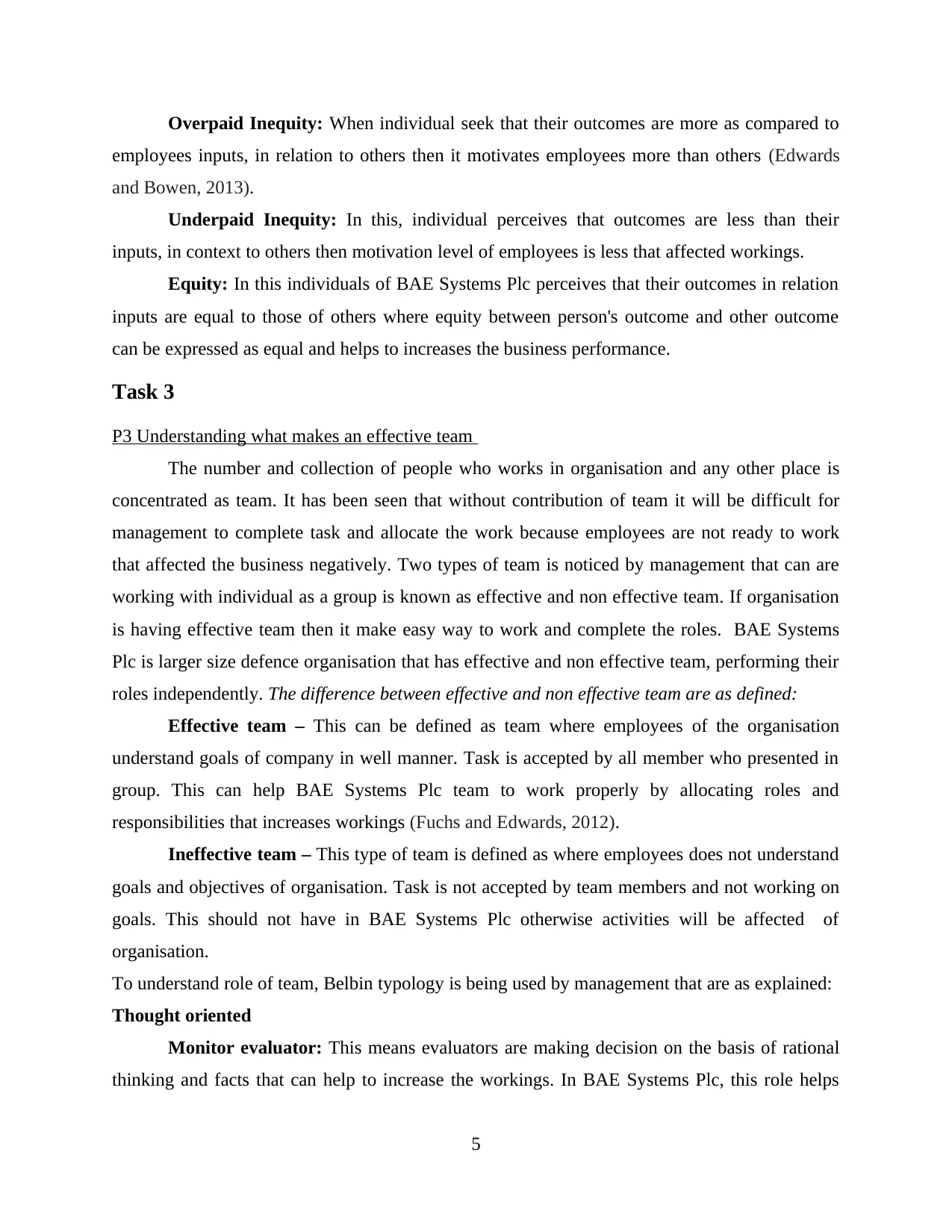
Overpaid Inequity: When individual seek that their outcomes are more as compared to
employees inputs, in relation to others then it motivates employees more than others (Edwards
and Bowen, 2013).
Underpaid Inequity: In this, individual perceives that outcomes are less than their
inputs, in context to others then motivation level of employees is less that affected workings.
Equity: In this individuals of BAE Systems Plc perceives that their outcomes in relation
inputs are equal to those of others where equity between person's outcome and other outcome
can be expressed as equal and helps to increases the business performance.
Task 3
P3 Understanding what makes an effective team
The number and collection of people who works in organisation and any other place is
concentrated as team. It has been seen that without contribution of team it will be difficult for
management to complete task and allocate the work because employees are not ready to work
that affected the business negatively. Two types of team is noticed by management that can are
working with individual as a group is known as effective and non effective team. If organisation
is having effective team then it make easy way to work and complete the roles. BAE Systems
Plc is larger size defence organisation that has effective and non effective team, performing their
roles independently. The difference between effective and non effective team are as defined:
Effective team – This can be defined as team where employees of the organisation
understand goals of company in well manner. Task is accepted by all member who presented in
group. This can help BAE Systems Plc team to work properly by allocating roles and
responsibilities that increases workings (Fuchs and Edwards, 2012).
Ineffective team – This type of team is defined as where employees does not understand
goals and objectives of organisation. Task is not accepted by team members and not working on
goals. This should not have in BAE Systems Plc otherwise activities will be affected of
organisation.
To understand role of team, Belbin typology is being used by management that are as explained:
Thought oriented
Monitor evaluator: This means evaluators are making decision on the basis of rational
thinking and facts that can help to increase the workings. In BAE Systems Plc, this role helps
5
employees inputs, in relation to others then it motivates employees more than others (Edwards
and Bowen, 2013).
Underpaid Inequity: In this, individual perceives that outcomes are less than their
inputs, in context to others then motivation level of employees is less that affected workings.
Equity: In this individuals of BAE Systems Plc perceives that their outcomes in relation
inputs are equal to those of others where equity between person's outcome and other outcome
can be expressed as equal and helps to increases the business performance.
Task 3
P3 Understanding what makes an effective team
The number and collection of people who works in organisation and any other place is
concentrated as team. It has been seen that without contribution of team it will be difficult for
management to complete task and allocate the work because employees are not ready to work
that affected the business negatively. Two types of team is noticed by management that can are
working with individual as a group is known as effective and non effective team. If organisation
is having effective team then it make easy way to work and complete the roles. BAE Systems
Plc is larger size defence organisation that has effective and non effective team, performing their
roles independently. The difference between effective and non effective team are as defined:
Effective team – This can be defined as team where employees of the organisation
understand goals of company in well manner. Task is accepted by all member who presented in
group. This can help BAE Systems Plc team to work properly by allocating roles and
responsibilities that increases workings (Fuchs and Edwards, 2012).
Ineffective team – This type of team is defined as where employees does not understand
goals and objectives of organisation. Task is not accepted by team members and not working on
goals. This should not have in BAE Systems Plc otherwise activities will be affected of
organisation.
To understand role of team, Belbin typology is being used by management that are as explained:
Thought oriented
Monitor evaluator: This means evaluators are making decision on the basis of rational
thinking and facts that can help to increase the workings. In BAE Systems Plc, this role helps
5
Paraphrase This Document
Need a fresh take? Get an instant paraphrase of this document with our AI Paraphraser
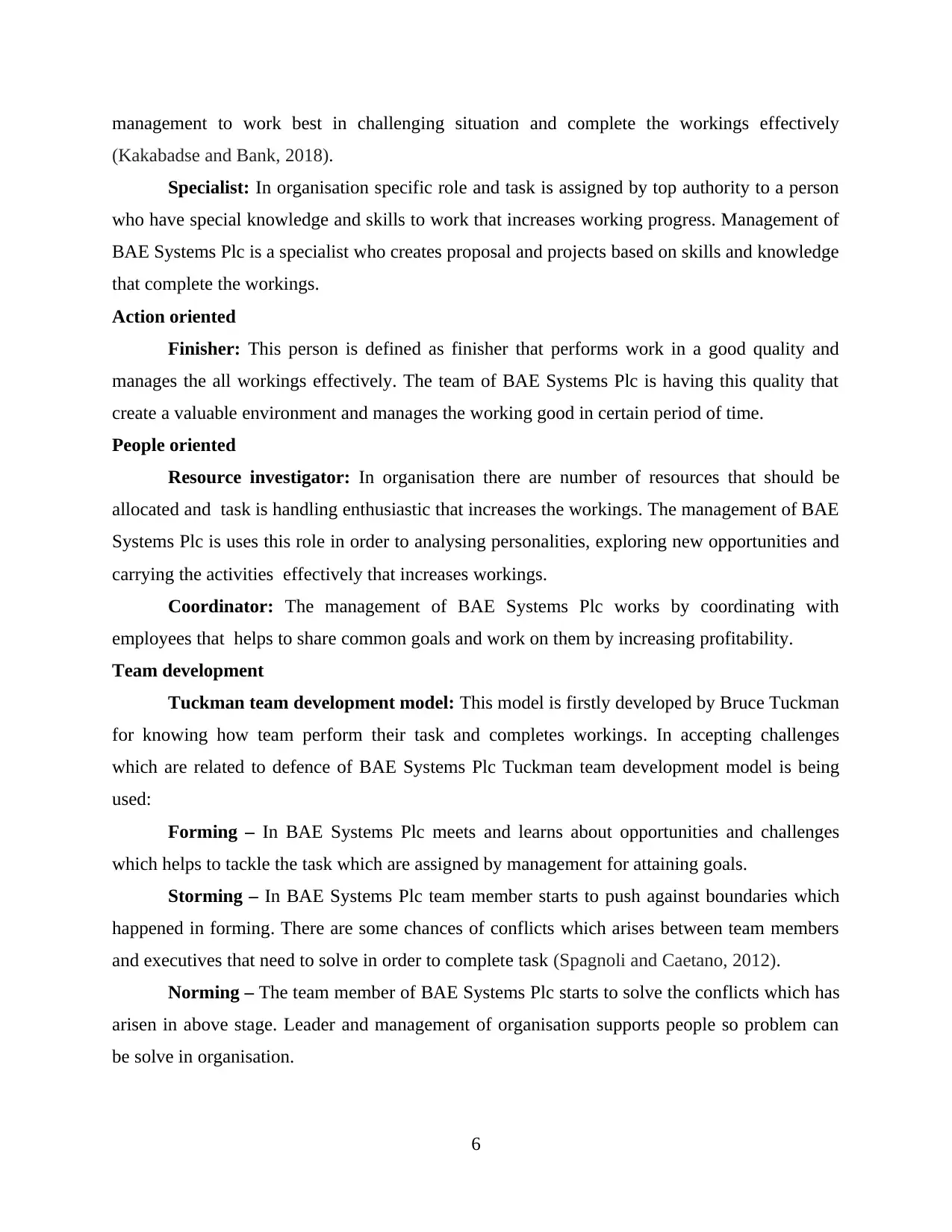
management to work best in challenging situation and complete the workings effectively
(Kakabadse and Bank, 2018).
Specialist: In organisation specific role and task is assigned by top authority to a person
who have special knowledge and skills to work that increases working progress. Management of
BAE Systems Plc is a specialist who creates proposal and projects based on skills and knowledge
that complete the workings.
Action oriented
Finisher: This person is defined as finisher that performs work in a good quality and
manages the all workings effectively. The team of BAE Systems Plc is having this quality that
create a valuable environment and manages the working good in certain period of time.
People oriented
Resource investigator: In organisation there are number of resources that should be
allocated and task is handling enthusiastic that increases the workings. The management of BAE
Systems Plc is uses this role in order to analysing personalities, exploring new opportunities and
carrying the activities effectively that increases workings.
Coordinator: The management of BAE Systems Plc works by coordinating with
employees that helps to share common goals and work on them by increasing profitability.
Team development
Tuckman team development model: This model is firstly developed by Bruce Tuckman
for knowing how team perform their task and completes workings. In accepting challenges
which are related to defence of BAE Systems Plc Tuckman team development model is being
used:
Forming – In BAE Systems Plc meets and learns about opportunities and challenges
which helps to tackle the task which are assigned by management for attaining goals.
Storming – In BAE Systems Plc team member starts to push against boundaries which
happened in forming. There are some chances of conflicts which arises between team members
and executives that need to solve in order to complete task (Spagnoli and Caetano, 2012).
Norming – The team member of BAE Systems Plc starts to solve the conflicts which has
arisen in above stage. Leader and management of organisation supports people so problem can
be solve in organisation.
6
(Kakabadse and Bank, 2018).
Specialist: In organisation specific role and task is assigned by top authority to a person
who have special knowledge and skills to work that increases working progress. Management of
BAE Systems Plc is a specialist who creates proposal and projects based on skills and knowledge
that complete the workings.
Action oriented
Finisher: This person is defined as finisher that performs work in a good quality and
manages the all workings effectively. The team of BAE Systems Plc is having this quality that
create a valuable environment and manages the working good in certain period of time.
People oriented
Resource investigator: In organisation there are number of resources that should be
allocated and task is handling enthusiastic that increases the workings. The management of BAE
Systems Plc is uses this role in order to analysing personalities, exploring new opportunities and
carrying the activities effectively that increases workings.
Coordinator: The management of BAE Systems Plc works by coordinating with
employees that helps to share common goals and work on them by increasing profitability.
Team development
Tuckman team development model: This model is firstly developed by Bruce Tuckman
for knowing how team perform their task and completes workings. In accepting challenges
which are related to defence of BAE Systems Plc Tuckman team development model is being
used:
Forming – In BAE Systems Plc meets and learns about opportunities and challenges
which helps to tackle the task which are assigned by management for attaining goals.
Storming – In BAE Systems Plc team member starts to push against boundaries which
happened in forming. There are some chances of conflicts which arises between team members
and executives that need to solve in order to complete task (Spagnoli and Caetano, 2012).
Norming – The team member of BAE Systems Plc starts to solve the conflicts which has
arisen in above stage. Leader and management of organisation supports people so problem can
be solve in organisation.
6
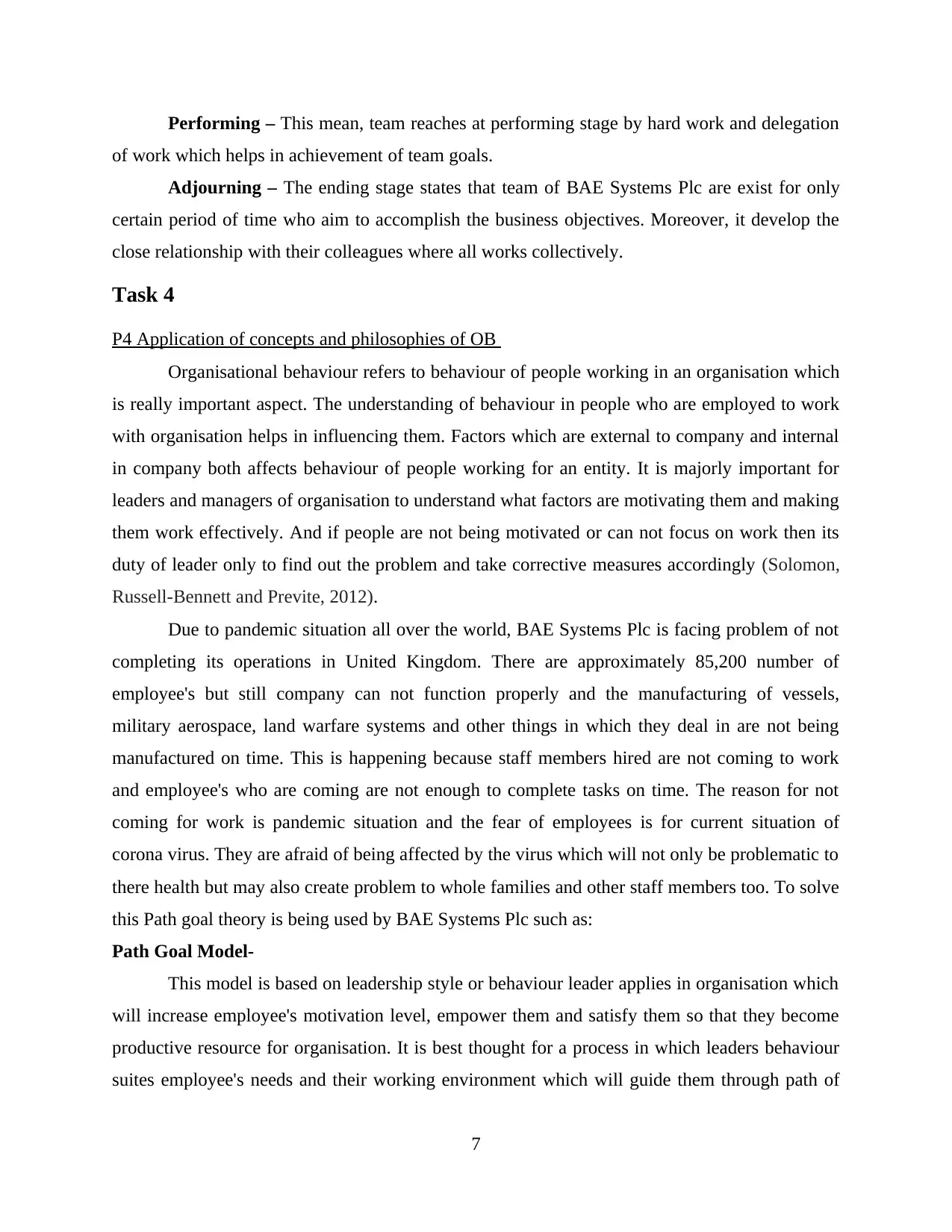
Performing – This mean, team reaches at performing stage by hard work and delegation
of work which helps in achievement of team goals.
Adjourning – The ending stage states that team of BAE Systems Plc are exist for only
certain period of time who aim to accomplish the business objectives. Moreover, it develop the
close relationship with their colleagues where all works collectively.
Task 4
P4 Application of concepts and philosophies of OB
Organisational behaviour refers to behaviour of people working in an organisation which
is really important aspect. The understanding of behaviour in people who are employed to work
with organisation helps in influencing them. Factors which are external to company and internal
in company both affects behaviour of people working for an entity. It is majorly important for
leaders and managers of organisation to understand what factors are motivating them and making
them work effectively. And if people are not being motivated or can not focus on work then its
duty of leader only to find out the problem and take corrective measures accordingly (Solomon,
Russell-Bennett and Previte, 2012).
Due to pandemic situation all over the world, BAE Systems Plc is facing problem of not
completing its operations in United Kingdom. There are approximately 85,200 number of
employee's but still company can not function properly and the manufacturing of vessels,
military aerospace, land warfare systems and other things in which they deal in are not being
manufactured on time. This is happening because staff members hired are not coming to work
and employee's who are coming are not enough to complete tasks on time. The reason for not
coming for work is pandemic situation and the fear of employees is for current situation of
corona virus. They are afraid of being affected by the virus which will not only be problematic to
there health but may also create problem to whole families and other staff members too. To solve
this Path goal theory is being used by BAE Systems Plc such as:
Path Goal Model-
This model is based on leadership style or behaviour leader applies in organisation which
will increase employee's motivation level, empower them and satisfy them so that they become
productive resource for organisation. It is best thought for a process in which leaders behaviour
suites employee's needs and their working environment which will guide them through path of
7
of work which helps in achievement of team goals.
Adjourning – The ending stage states that team of BAE Systems Plc are exist for only
certain period of time who aim to accomplish the business objectives. Moreover, it develop the
close relationship with their colleagues where all works collectively.
Task 4
P4 Application of concepts and philosophies of OB
Organisational behaviour refers to behaviour of people working in an organisation which
is really important aspect. The understanding of behaviour in people who are employed to work
with organisation helps in influencing them. Factors which are external to company and internal
in company both affects behaviour of people working for an entity. It is majorly important for
leaders and managers of organisation to understand what factors are motivating them and making
them work effectively. And if people are not being motivated or can not focus on work then its
duty of leader only to find out the problem and take corrective measures accordingly (Solomon,
Russell-Bennett and Previte, 2012).
Due to pandemic situation all over the world, BAE Systems Plc is facing problem of not
completing its operations in United Kingdom. There are approximately 85,200 number of
employee's but still company can not function properly and the manufacturing of vessels,
military aerospace, land warfare systems and other things in which they deal in are not being
manufactured on time. This is happening because staff members hired are not coming to work
and employee's who are coming are not enough to complete tasks on time. The reason for not
coming for work is pandemic situation and the fear of employees is for current situation of
corona virus. They are afraid of being affected by the virus which will not only be problematic to
there health but may also create problem to whole families and other staff members too. To solve
this Path goal theory is being used by BAE Systems Plc such as:
Path Goal Model-
This model is based on leadership style or behaviour leader applies in organisation which
will increase employee's motivation level, empower them and satisfy them so that they become
productive resource for organisation. It is best thought for a process in which leaders behaviour
suites employee's needs and their working environment which will guide them through path of
7
⊘ This is a preview!⊘
Do you want full access?
Subscribe today to unlock all pages.

Trusted by 1+ million students worldwide
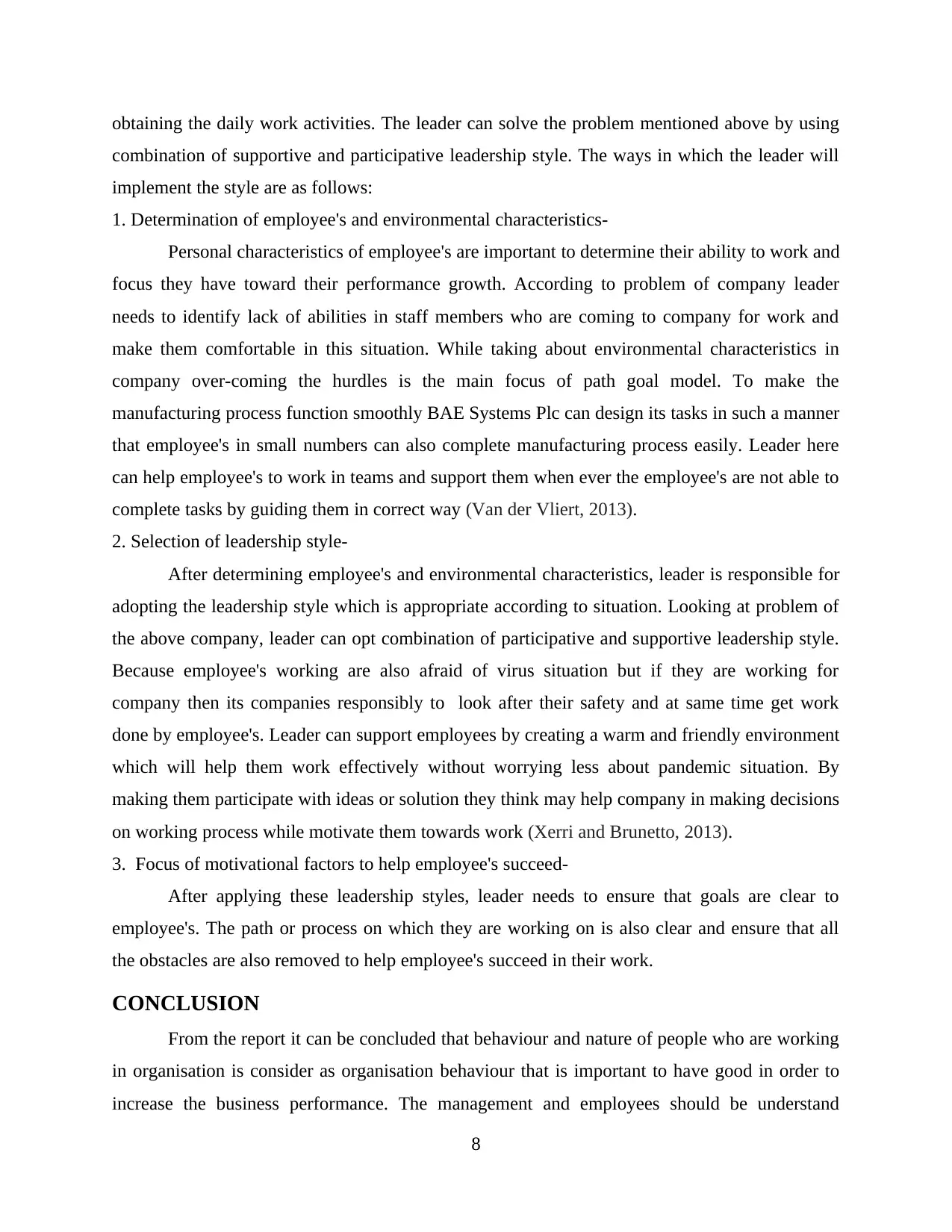
obtaining the daily work activities. The leader can solve the problem mentioned above by using
combination of supportive and participative leadership style. The ways in which the leader will
implement the style are as follows:
1. Determination of employee's and environmental characteristics-
Personal characteristics of employee's are important to determine their ability to work and
focus they have toward their performance growth. According to problem of company leader
needs to identify lack of abilities in staff members who are coming to company for work and
make them comfortable in this situation. While taking about environmental characteristics in
company over-coming the hurdles is the main focus of path goal model. To make the
manufacturing process function smoothly BAE Systems Plc can design its tasks in such a manner
that employee's in small numbers can also complete manufacturing process easily. Leader here
can help employee's to work in teams and support them when ever the employee's are not able to
complete tasks by guiding them in correct way (Van der Vliert, 2013).
2. Selection of leadership style-
After determining employee's and environmental characteristics, leader is responsible for
adopting the leadership style which is appropriate according to situation. Looking at problem of
the above company, leader can opt combination of participative and supportive leadership style.
Because employee's working are also afraid of virus situation but if they are working for
company then its companies responsibly to look after their safety and at same time get work
done by employee's. Leader can support employees by creating a warm and friendly environment
which will help them work effectively without worrying less about pandemic situation. By
making them participate with ideas or solution they think may help company in making decisions
on working process while motivate them towards work (Xerri and Brunetto, 2013).
3. Focus of motivational factors to help employee's succeed-
After applying these leadership styles, leader needs to ensure that goals are clear to
employee's. The path or process on which they are working on is also clear and ensure that all
the obstacles are also removed to help employee's succeed in their work.
CONCLUSION
From the report it can be concluded that behaviour and nature of people who are working
in organisation is consider as organisation behaviour that is important to have good in order to
increase the business performance. The management and employees should be understand
8
combination of supportive and participative leadership style. The ways in which the leader will
implement the style are as follows:
1. Determination of employee's and environmental characteristics-
Personal characteristics of employee's are important to determine their ability to work and
focus they have toward their performance growth. According to problem of company leader
needs to identify lack of abilities in staff members who are coming to company for work and
make them comfortable in this situation. While taking about environmental characteristics in
company over-coming the hurdles is the main focus of path goal model. To make the
manufacturing process function smoothly BAE Systems Plc can design its tasks in such a manner
that employee's in small numbers can also complete manufacturing process easily. Leader here
can help employee's to work in teams and support them when ever the employee's are not able to
complete tasks by guiding them in correct way (Van der Vliert, 2013).
2. Selection of leadership style-
After determining employee's and environmental characteristics, leader is responsible for
adopting the leadership style which is appropriate according to situation. Looking at problem of
the above company, leader can opt combination of participative and supportive leadership style.
Because employee's working are also afraid of virus situation but if they are working for
company then its companies responsibly to look after their safety and at same time get work
done by employee's. Leader can support employees by creating a warm and friendly environment
which will help them work effectively without worrying less about pandemic situation. By
making them participate with ideas or solution they think may help company in making decisions
on working process while motivate them towards work (Xerri and Brunetto, 2013).
3. Focus of motivational factors to help employee's succeed-
After applying these leadership styles, leader needs to ensure that goals are clear to
employee's. The path or process on which they are working on is also clear and ensure that all
the obstacles are also removed to help employee's succeed in their work.
CONCLUSION
From the report it can be concluded that behaviour and nature of people who are working
in organisation is consider as organisation behaviour that is important to have good in order to
increase the business performance. The management and employees should be understand
8
Paraphrase This Document
Need a fresh take? Get an instant paraphrase of this document with our AI Paraphraser
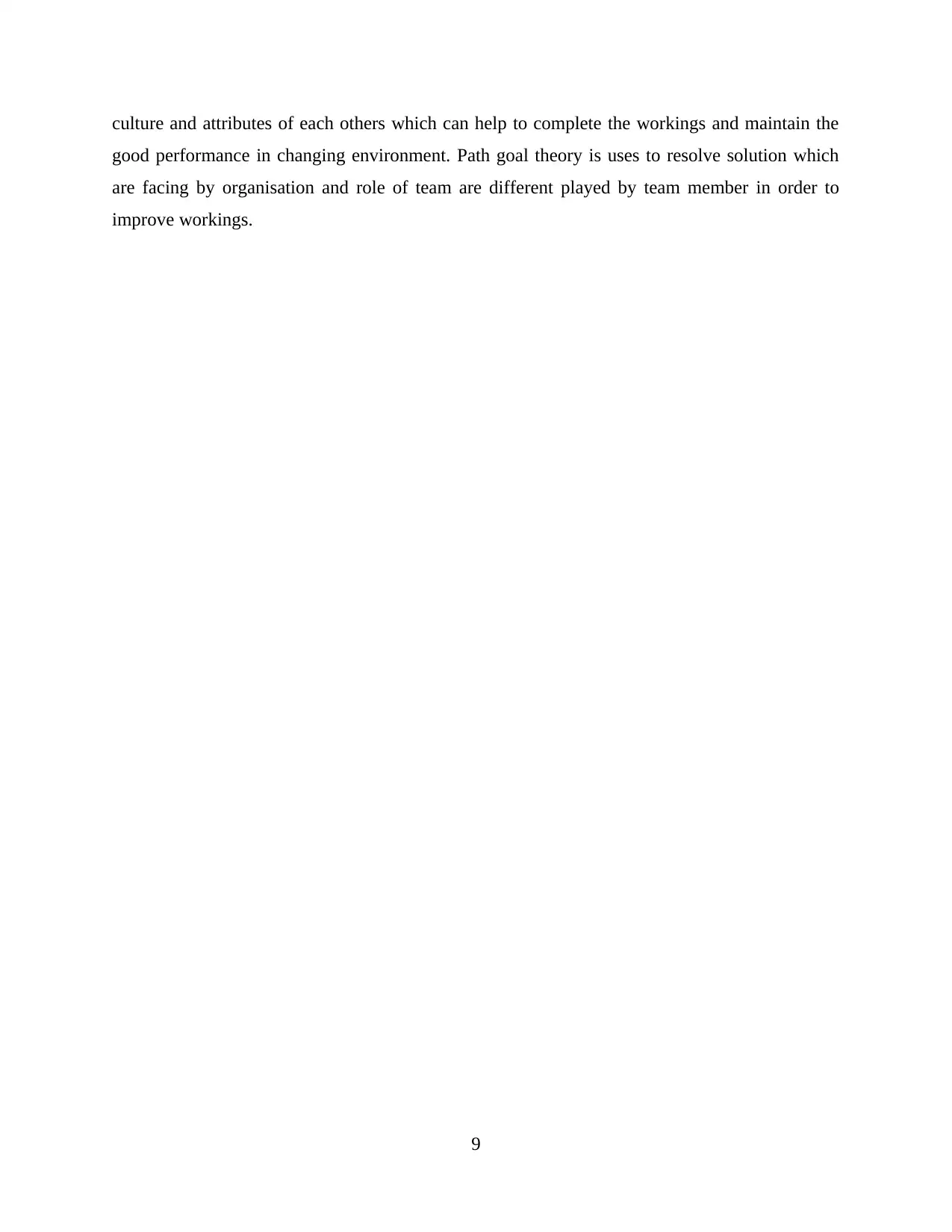
culture and attributes of each others which can help to complete the workings and maintain the
good performance in changing environment. Path goal theory is uses to resolve solution which
are facing by organisation and role of team are different played by team member in order to
improve workings.
9
good performance in changing environment. Path goal theory is uses to resolve solution which
are facing by organisation and role of team are different played by team member in order to
improve workings.
9
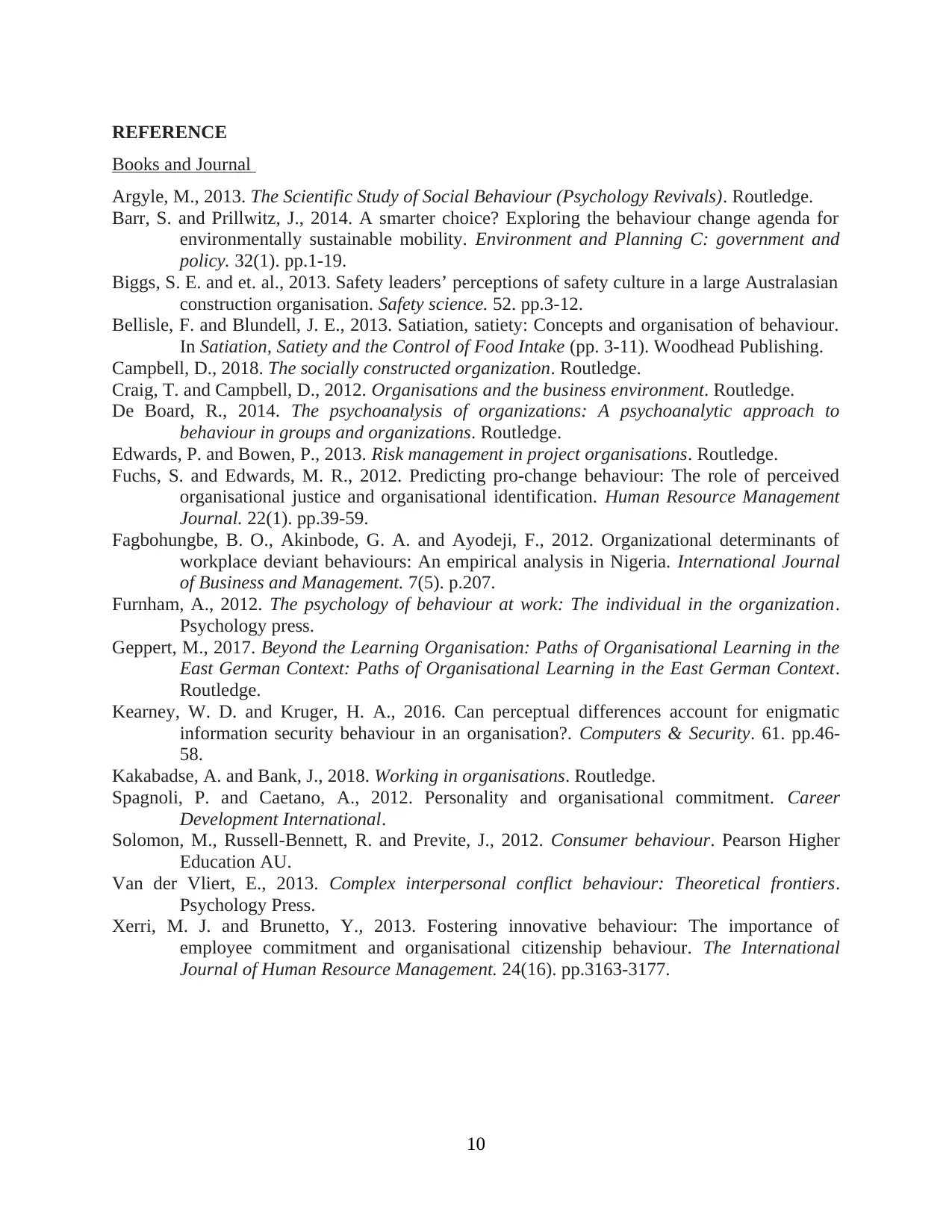
REFERENCE
Books and Journal
Argyle, M., 2013. The Scientific Study of Social Behaviour (Psychology Revivals). Routledge.
Barr, S. and Prillwitz, J., 2014. A smarter choice? Exploring the behaviour change agenda for
environmentally sustainable mobility. Environment and Planning C: government and
policy. 32(1). pp.1-19.
Biggs, S. E. and et. al., 2013. Safety leaders’ perceptions of safety culture in a large Australasian
construction organisation. Safety science. 52. pp.3-12.
Bellisle, F. and Blundell, J. E., 2013. Satiation, satiety: Concepts and organisation of behaviour.
In Satiation, Satiety and the Control of Food Intake (pp. 3-11). Woodhead Publishing.
Campbell, D., 2018. The socially constructed organization. Routledge.
Craig, T. and Campbell, D., 2012. Organisations and the business environment. Routledge.
De Board, R., 2014. The psychoanalysis of organizations: A psychoanalytic approach to
behaviour in groups and organizations. Routledge.
Edwards, P. and Bowen, P., 2013. Risk management in project organisations. Routledge.
Fuchs, S. and Edwards, M. R., 2012. Predicting pro‐change behaviour: The role of perceived
organisational justice and organisational identification. Human Resource Management
Journal. 22(1). pp.39-59.
Fagbohungbe, B. O., Akinbode, G. A. and Ayodeji, F., 2012. Organizational determinants of
workplace deviant behaviours: An empirical analysis in Nigeria. International Journal
of Business and Management. 7(5). p.207.
Furnham, A., 2012. The psychology of behaviour at work: The individual in the organization.
Psychology press.
Geppert, M., 2017. Beyond the Learning Organisation: Paths of Organisational Learning in the
East German Context: Paths of Organisational Learning in the East German Context.
Routledge.
Kearney, W. D. and Kruger, H. A., 2016. Can perceptual differences account for enigmatic
information security behaviour in an organisation?. Computers & Security. 61. pp.46-
58.
Kakabadse, A. and Bank, J., 2018. Working in organisations. Routledge.
Spagnoli, P. and Caetano, A., 2012. Personality and organisational commitment. Career
Development International.
Solomon, M., Russell-Bennett, R. and Previte, J., 2012. Consumer behaviour. Pearson Higher
Education AU.
Van der Vliert, E., 2013. Complex interpersonal conflict behaviour: Theoretical frontiers.
Psychology Press.
Xerri, M. J. and Brunetto, Y., 2013. Fostering innovative behaviour: The importance of
employee commitment and organisational citizenship behaviour. The International
Journal of Human Resource Management. 24(16). pp.3163-3177.
10
Books and Journal
Argyle, M., 2013. The Scientific Study of Social Behaviour (Psychology Revivals). Routledge.
Barr, S. and Prillwitz, J., 2014. A smarter choice? Exploring the behaviour change agenda for
environmentally sustainable mobility. Environment and Planning C: government and
policy. 32(1). pp.1-19.
Biggs, S. E. and et. al., 2013. Safety leaders’ perceptions of safety culture in a large Australasian
construction organisation. Safety science. 52. pp.3-12.
Bellisle, F. and Blundell, J. E., 2013. Satiation, satiety: Concepts and organisation of behaviour.
In Satiation, Satiety and the Control of Food Intake (pp. 3-11). Woodhead Publishing.
Campbell, D., 2018. The socially constructed organization. Routledge.
Craig, T. and Campbell, D., 2012. Organisations and the business environment. Routledge.
De Board, R., 2014. The psychoanalysis of organizations: A psychoanalytic approach to
behaviour in groups and organizations. Routledge.
Edwards, P. and Bowen, P., 2013. Risk management in project organisations. Routledge.
Fuchs, S. and Edwards, M. R., 2012. Predicting pro‐change behaviour: The role of perceived
organisational justice and organisational identification. Human Resource Management
Journal. 22(1). pp.39-59.
Fagbohungbe, B. O., Akinbode, G. A. and Ayodeji, F., 2012. Organizational determinants of
workplace deviant behaviours: An empirical analysis in Nigeria. International Journal
of Business and Management. 7(5). p.207.
Furnham, A., 2012. The psychology of behaviour at work: The individual in the organization.
Psychology press.
Geppert, M., 2017. Beyond the Learning Organisation: Paths of Organisational Learning in the
East German Context: Paths of Organisational Learning in the East German Context.
Routledge.
Kearney, W. D. and Kruger, H. A., 2016. Can perceptual differences account for enigmatic
information security behaviour in an organisation?. Computers & Security. 61. pp.46-
58.
Kakabadse, A. and Bank, J., 2018. Working in organisations. Routledge.
Spagnoli, P. and Caetano, A., 2012. Personality and organisational commitment. Career
Development International.
Solomon, M., Russell-Bennett, R. and Previte, J., 2012. Consumer behaviour. Pearson Higher
Education AU.
Van der Vliert, E., 2013. Complex interpersonal conflict behaviour: Theoretical frontiers.
Psychology Press.
Xerri, M. J. and Brunetto, Y., 2013. Fostering innovative behaviour: The importance of
employee commitment and organisational citizenship behaviour. The International
Journal of Human Resource Management. 24(16). pp.3163-3177.
10
⊘ This is a preview!⊘
Do you want full access?
Subscribe today to unlock all pages.

Trusted by 1+ million students worldwide
1 out of 12
Related Documents
Your All-in-One AI-Powered Toolkit for Academic Success.
+13062052269
info@desklib.com
Available 24*7 on WhatsApp / Email
![[object Object]](/_next/static/media/star-bottom.7253800d.svg)
Unlock your academic potential
Copyright © 2020–2025 A2Z Services. All Rights Reserved. Developed and managed by ZUCOL.





